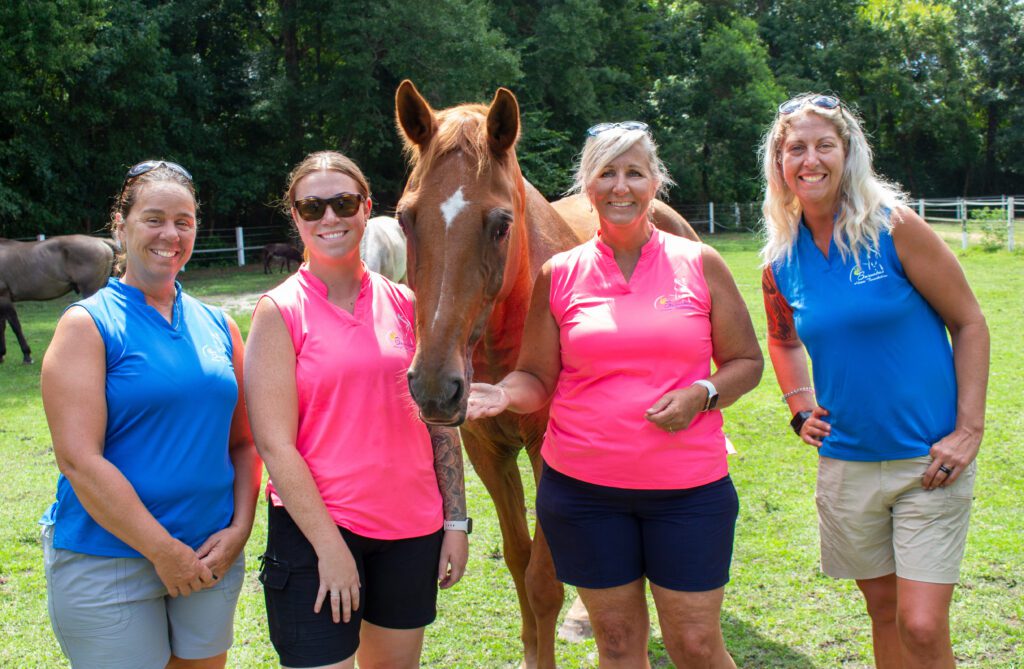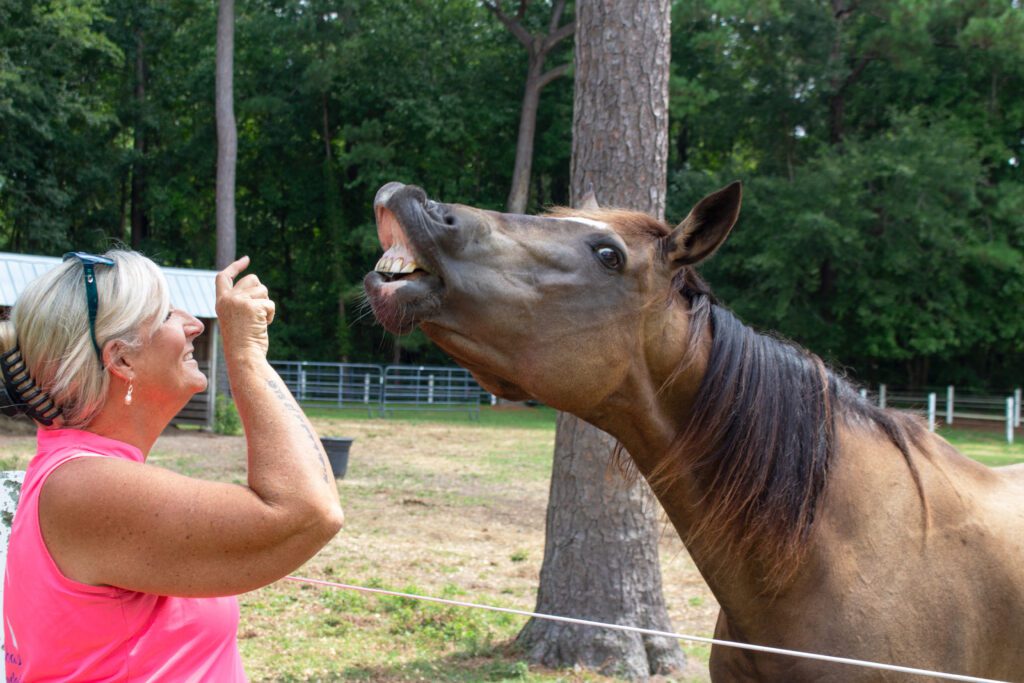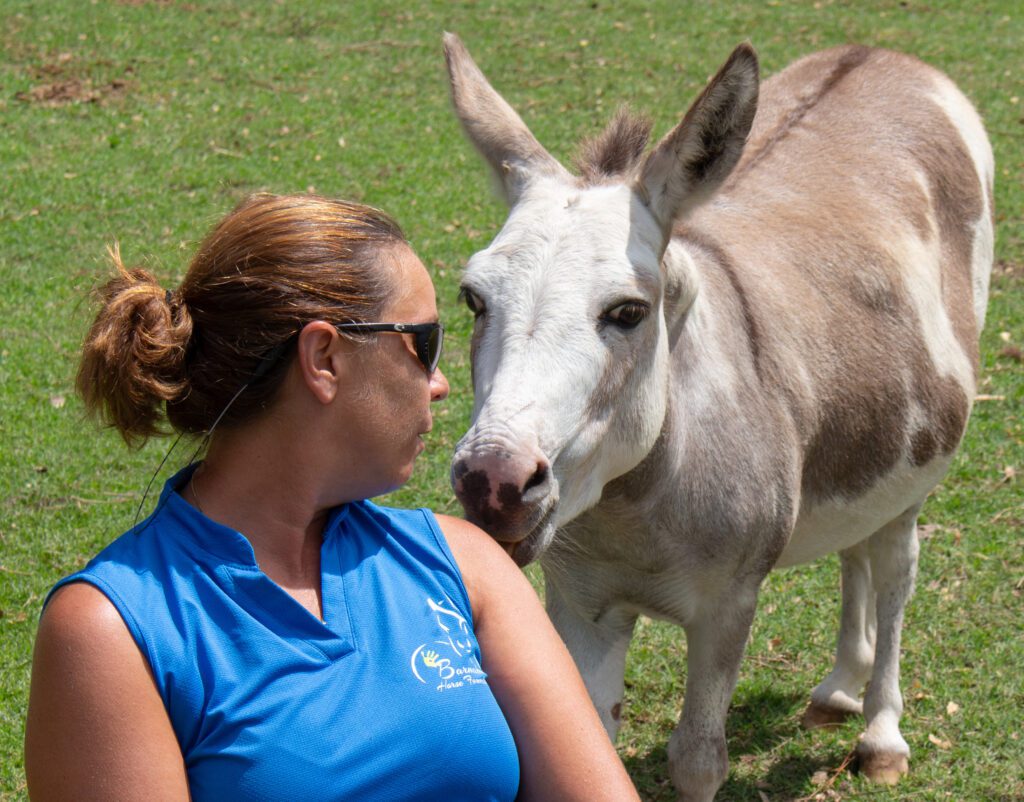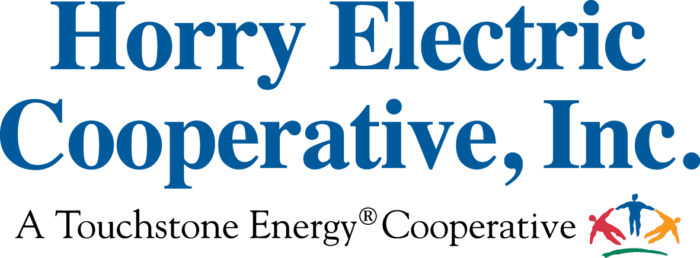
A vision started it all. Sue McKinney, an Horry Electric member in Murrells Inlet, is a childhood trauma survivor. Her path to healing began with her love of horses.
McKinney moved to Horry County when she was 11 years old. That’s when she got her first horse. She grew up showing horses and went to school to learn horse farm management. “Horses helped me growing up,” says McKinney. “If it weren’t for my horse, I wouldn’t be sitting here today.”
A first-hand witness to how horses can help people heal, McKinney was inspired to create the Barnabas Horse Foundation in 2011. She was recently named the winner of Horry Electric’s #WhoPowersYou contest, receiving a $500 prize. She was entered into the statewide #WhoPowersYou contest for a chance to win $2,500.
“The work Mrs. McKinney and the team at Barnabas are doing is admirable,” says Executive Vice President and CEO Danny Shelley. “Her mission and purpose whole-heartedly embraces concern for community. We admire and appreciate the work Barnabas does.”

The Barnabas Horse Foundation began offering equine-assisted psychotherapy to abused and traumatized children. Barnabas means “encourager.” Today, the Foundation has three full-time staff members, including McKinney. Working alongside her are Jenn Faro, who nominated McKinney for the #WhoPowersYou award, Tiffany Mansy and part-time employee, Hannah Blancett. All are certified life coaches and certified victim service providers. The largest group of employees at Barnabas includes 19 standard-sized horses, seven miniature horses and a few donkeys.
As a therapeutic facility, the staff at Barnabas now provides equine-assisted psychotherapy, coaching and learning to victims of crime, veterans and first responders. McKinney and her team see 100 clients a month, on average. They work with issues ranging from bullying to sexual assault to post-traumatic stress disorder (PTSD). With a goal of helping individuals process through their trauma and begin healing, Barnabas operates on the foundation of building healthy relationships – with horses, families and coworkers.
Neurobiology and the nervous system
Fight, flight or freeze is the body’s natural reaction to danger. Having been hunted in the wild, horses resort to this response, similar to a person who has been victimized or experienced trauma. In order to begin the healing process, McKinney and her team start with what they call “Bottom Up Regulation” to help re-wire the brain.
They start with the brainstem, the part of the brain that interconnects the cerebrum and diencephalon with the spinal cord.
“The diencephalon is the part of our brain responsible for movement,” says McKinney. “Then you have the limbic system, the part responsible for our emotions and where we build relationships. Wrapped around that is the neocortex, which is the abstract and logical part we use for math and science.”
The first step for a new client is observing the horses in their natural state. After that, the client and Barnabas horse professionals walk among the horses and meet them.
“Just from this alone, you’ve involved the brainstem, the diencephalon and the limbic system,” says McKinney. “Once we get those areas communicating with each other, then we help create pathways around the trauma up to the neocortex.
A safe space

Once a client meets all the horses, they choose the one they’ve connected with the most. From there, the relationship building process begins. Clients participate in activities such as grooming because it’s rhythmic and repetitive. This helps clients create a safe space. They work with their horses, while practicing breathing exercises and mindfulness.
“The felt safety allows the client to start moving in and out of what we call the ‘window of tolerance,'” says Faro. “When the client has access to their trauma, they can go in a little bit to where they’re uncomfortable, but come back to felt safety.”
Instead of reacting to their trauma, clients learn to pause, problem-solve and respond in the moment.
“Horses learn the same way,” says Faro. “An easy example is how horses are terrified of plastic bags. As Sue and I were riding one day, a bag started rolling through the pasture and some of the horses started to run away. The horses we were on paused. They were able to problem solve and think, “Wait a minute, that’s just a plastic bag and not a monster to eat me.”
Feeling God’s blessings
Practicing building healthy, connected relationships is not only for clients, but for the staff at Barnabas. Helping a client process through their trauma is hard emotionally, mentally and physically for the life coaches.
“We can’t take our clients any farther than what we’re willing to do ourselves,” says McKinney. “You learn how to process through it and not focus on what has happened, but how you can help the person move forward.”
While some days are more challenging than others, McKinney and her team take time to recognize and feel God’s blessings.
Four part-time staff members, more than 65 volunteers and numerous sponsorships help Barnabas provide free services to clients, while also taking care of the horses. “It takes a village to run this foundation and we are so blessed,” says McKinney.
Barnabas Horse Foundation is the only alternative therapy program in the state that receives a Victims of Crime Advocacy (VOCA) grant from the South Carolina Attorney General’s Office. Preparing to accept their eighth grant, McKinney hopes to continue helping people through fellowship with horses. Her vision for the future is to create an entire wellness center and hire more staff.

